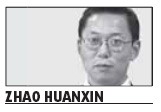
China Daily, People's Republic of China
Pleased and Perplexed
By U.S. Presidential Use of Chinese Proverbs
Have past and
present U.S. presidents used Chinese proverbs to good effect in their attempts
to reach out to the Chinese people? According to Zhau Huanxin of the state-run China
Daily, they have not, but that doesn't annoy Chinese one bit, particularly because
President Obama is better at it than most of his predecessors.

November 20, 2009
People's
Republic of China - China Daily - Original Article (English)
When Barack Obama journeyed to the Great Wall on Wednesday,
I wondered if he or someone on his team would come up with a Chinese saying or
two to express the president's feelings. As it turns out, Barack dropped some
Chinese proverbs, too.
I have always observed U.S. presidents on their trips to
China from a literary perspective, and in this sense I found Obama no different
from the others.
They've all exhibited tremendous "scholastic
prowess" by invoking Chinese poets, philosophers and proverbs. This always
seems to tickle Chinese ears, particularly due to a perplexity over how
pertinent the quotes actually are.
With two Chinese Americans in his cabinet - Commerce Secretary
Gary Locke and Energy Secretary Steven Chu - I believe Obama is surrounded by
more Sinophiles than any U.S. president in history. Obama seems particularly
adept in borrowing from this pool of Chinese brainpower to get his point
across.
Three months ago at the first China-U.S. Strategic and
Economic Dialogue, Obama turned to one of China's greatest philosopher Mencius [372-289 BC], when
emphasizing the importance of strengthening communication in order to resolve
disagreement between China and the U.S..
"A trail
through the mountains, if used, becomes a path in a short time, but, if unused,
becomes blocked by grass in an equally short time," said the
philosopher, who was born 2,380 years ago, through President Obama.
The Chinese thinker also helped former President Bill
Clinton express his ideas when he visited Beijing in the summer of 1998.
Clinton cited the teachings of Mencius to describe U.S.-China
cooperation on international issues: "A good citizen in one community will
befriend the other citizens of that community ... a good citizen of the world
will befriend the other citizens of the world."
Posted by WORLDMEETS.US November 26
Many people believe Clinton's speech matched the grandeur of
the entryway to the ancient Chinese capital of Xi'an when he said: "Let us
give new meaning to the words written in the ancient Book of Rites, which
you call the Li Shi: When the great way is followed, all under heaven will be
equal."
Time and again, I've found ancient Chinese references eloquently
employed to gain political ground by visiting U.S. leaders. When Ronald Reagan
visited Beijing in 1984, three years after he was sworn in, he said at a state
banquet: "Many centuries ago, Wang Bo [649–676], a famous
Chinese poet-philosopher, wrote, 'Although we reside in far corners of the
world, having a good friend is akin to having a good neighbor.'"
The next day he followed up with another line to highlight the
increasing trust and cooperation between Beijing and Washington: "Let us
be of the same mind. And as a saying from The Book of Changes goes, if
two people are of the same mind, their sharpness can cut through metal."
Posted by WORLDMEETS.US November 26
It's intriguing to know that Richard Nixon, the first U.S.
president to visit China in 1972, followed the style of almost all Chinese at
that time, who wouldn't make a speech without quoting "teachings"
from Chairman Mao Zedong.
"The Chairman has written: So many deeds cry out to be
done, and always urgently; the world rolls on, time presses. Ten thousand years
are too long; seize the day, seize the hour!" Nixon reportedly said at a reception
hosted by then Premier Zhou
Enlai.
Nixon was known to have tactfully followed the quote with the
remark, "This is the hour. This is the day for our two people,"
winning explosive applause from the hall.
Returning to Obama’s journey to the Great Wall, I think
Obama may have been reminded of - or may have even quoted - another line from
Chairman Mao: "Who are we if we cannot reach the Great Wall!"

President Barack Obama visits China's Great
Wall, Nov. 18.
 CLICK HERE OR CLICK PHOTO
FOR BBC COVERAGE OF TRIP'S END
CLICK HERE OR CLICK PHOTO
FOR BBC COVERAGE OF TRIP'S END
SEE ALSO ON THIS:
La Tribune, France:
Why Rising China Can't Compete With the 'American Dream'
Al Riyadh, Saudi Arabia:
'China Model' May Leave 'Washington Consensus' in the Dust
The Star, Malaysia:
Let's Hope a Risen China is More Responsible than U.S.
Financial Times Deutschland:
Obama's China Trip Heralds 'World Without Leadership'
Global Times, China :
The Well-Disguised
'Arrogance' Behind
Obama's Royal Bow
The Times, U.K.:
Obama Bow Shows 'Confidence'; Need
for Change After Bush
Global Times, China:
Addiction to Growth is China's 'Berlin Wall'
Global Times, China:
U.S. and Beijing Disagree on Obama's Chinese Name
Global Times, China:
Chinese Netizens Have 'Sharp Words' for President Obama
China Daily, China:
Obama Can Teach
Shanghai Officials
a Thing or Two
China Daily, China:
VIDEO - Chinese React to
Visit of President Obama
Global Times, China:
'Obscene Postcard' Emerges
of Taiwan President and Hillary
Der Spiegel:
German Editorials - Obama's Soft Approach to China Won't Succeed
The Times, U.K.
Obama's Bow to Japan Emperor
Shows U.S. 'Confidence'
The Telegraph, U.K.:
Obama 'Breaks
Conciliatory Tone';
Criticizes China Censorship
The Australian, Australia:
Obama's Personal Story No
Substitute for Policy in Asia
Globe & Mail, Canada:
China 'Plays Down' President Obama's Visit

[Posted by WORLDMEETS.US
November 26, 10:28pm]